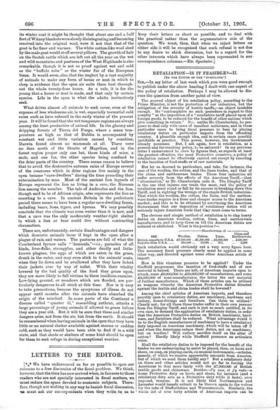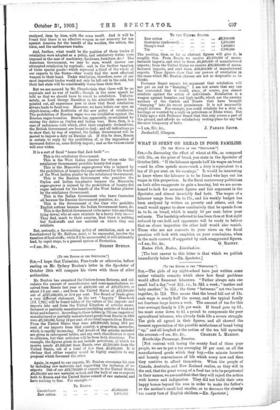LETTERS TO THE EDITOR.
[se We have endeavoured as far as possible to open our columns to a free discussion of the fiscal problem. We think, however, that the time has now arrived when, in fairness to those readers who are not specially interested in fiscal matters, we must reduce the space devoted to economic subjects. There- fore, though not wishing in any way to banish fiscal discussion, vae must ask our correspondents when they writetptq us to keep their letters as short as possible, and to deal with the practical rather than the argumentative side of the question. We trust, then, that when we reject letters on either side it will be recognised that such refusal is not due to any desire to shirk discussion, but to a regard for the other interests which have always been represented in our correspondence columns.—En. Spectator.]
RETALIATION—IS IT FEASIBLE
[To THE EDITOR OP THE " SPECTATOR:1
Sut,—In my letter of last week which you were good enough. to publish under the above heading I dealt with one aspect of the policy of retaliation. Perhaps I may be allowed to dis- cuss the question from another point of view.
The avowed object of his retaliation policy, according to the Prime Minister, is not the protection of our industries, but the mitigation of the severity of hostile tariffs,—an object laudable enough. He "contemplates no such procedure in regard to this country" as the imposition of a "combative tariff placed upon all foreign goods, to be reduced for the benefit of other nations which give something in return." No ; unlike Mr. Chamberlain, he pro poses to deal only with cases of manifest unfairness, and in these particular cases to bring fiscal pressure to bear by placing retaliatory duties on particular imports from the offending. country. A plausible enough idea, and in certain cases possibly justifiable in practice. This power, however, the Government already possesses. But, I ask again, how is retaliation, as a general and far-reaching policy, to be enforced? In my previous letter I endeavoured to show by figures that, as regards at least the greatest offenders, the most Protective countries, a policy of retaliation cannot be effectively carried out except by resorting to the taxation of food-stuffs or of raw materials.
But let us descend to particulars, and take, for instance, the case of the woollen, the cotton, and the linen trades, and that of the china and earthenware trades. These four industries all suffer severely from the effects of the American Tariff,—that "abomination," as Mr. Chamberlain calls it. The Dingley Tariff is the one that injures our trade the most, and the policy of retaliation must stand or fall by its success in breaking down this Tariff, and in righting the wrongs of the staple British industries. That which the woollen, the cotton, the linen, and the earthen- ware trades require is a freer and cheaper access to the American market; and this is to be obtained by convincing the American Government that our imposition of retaliatory duties will so seriously injure American trade that they must come to terms.
The obvious and simple method of retaliation is to clap heavy duties on American woollen, cotton, linen, and earthenware manufactures, and to keep them on till the American duties are reduced or abolished. What is the position ?—
Manufactures of China and 1902. Woollen. Cotton. Linen. Earthenware.
British exports to U.S.A. 23,300,000 ...21,500,000 ...E3,000,000 E500,000 Imports from U.S.A. 260,000 ... 18,000 ... Nil. ... 2,600
Such retaliation would obviously cut a very sorry figure here. The necessary fiscal pressure clearly must be applied in some other way, and directed against some other American article of import.
How is this vicarious pressure to be applied? Under the Sheffield programme the taxation of food-stuffs and of raw material is barred. There are left, of American imports open to attack, some 49,000,000 to 410,000,000 of manufactures, and some 44,000,000 of semi-manufactures, the latter the raw material of further manufacture. Which of these articles can be utilised as weapons whereby the American Protective duties directed
against the textile and china trades shall be lowered P Among the chief articles of American imports, and therefore possibly open to retaliatory duties, are machinery, hardware and cutlery, house-fittings and furniture. Can these be utilised? Clearly not; for all these three trades suffer in their own persons from the Dingley Tariff, and each is just as much entitled, in its own case, to demand the application of retaliatory duties, in order that the American Protective duties on British machinery, hard- ware, and furniture shall be reduced. What advantage would it be to the English manufacturer of machinery to have 'a retaliatory duty imposed on American machinery, which will be taken oft if and when the Americans reduce their duties, not on machinery, but on woollen? Will cutlery sacrifice itself on the altar of cotton? Hardly likely while Sheffield possesses an articulate voice.
Shall the retaliatory duties to be imposed for the benefit of the trades we are endeavouring to assist be placed, then, on boots and shoes, on soap, on playing-cards, on musical instruments,—articles, namely, of which we receive appreciable amounts from America, but of which we send them hardly any ? But a retaliatory duty on these and other articles would not go far in forcing the Americans to deal more fairly with the 47,500,000 of British . textile goods and chinaware. Besides—Ty swis, et j'y reste—a home ProtectiVe duty on boots and shoes, for instance (and a retaliatory duty acts as a Protective duty while it lasts), once imposed, remains. It is not likely that Northampton and Leicester would tamely submit to be thrown again to the wolves for the sake of Staffordshire and Worcestershire. Similarly, the whole list of over forty articles of American imports -can be
analysed, item by item, with the same result. And it will be found that there is no effective weapon in our armoury for use against America for the benefit of the woollen, the cotton, the linen, and the earthenware trades.
Arid, further, what would be the position of those trades if retaliation were adopted as a policy, and retaliatory duties were imposed in the ease of machinery, hardware, furniture, &c. ? The American Government, we may be sure, would answer our attempted retaliation by reprisals ; and, in the further taxation of these special goods—which represent a third of the whole of our exports to the States—they would find the most effectual weapon to their hand. Under retaliation, therefore, some of our most important trades would not only be left out in the cold, but their last state will be considerably worse than their first.
But we are assured by Mr. Chamberlain that there will be no reprisals and no war of tariffs; though in the same speech he told us that we should have to resort to retaliation. Unfortu- nately, as Lord George Hamilton in his admirable speech has pointed out, all experience goes to show that fiscal retaliation always leads to fiscal war. Moreover, we have before our eyes an object-lesson,--the firstfruits of the new policy of retaliation. The prohibition of Russian sugar was our retaliation against the Russian sugar-bounties. Russia has, apparently, re-retaliated by raising the duties on Ceylon and Indian teas. Here, then, is a case of unfairness with which, after their emphatic declarations, the British Government are bound to deal ; and all indications go to show that, by way of reprisal, the Indian Government will be moved to impose a duty on Russian oil. If this be done, Russia is certain to reply by the prohibition of, or the imposition of increased duties on, some British import ; and so the vicious circle
It is a sort of fiscal "house that Jack built " :—
This is the retaliatory Government. This is the West Indian planter for whose sake the retaliatory Government prohibits bounty-fed sugar. This is the Muscovite sugar-grower who is injured by the prohibition of bounty-fed sugar enforced for the benefit of the West Indian planter by the retaliatory Government. This is the Russian Government who punishes the Ceylon and Indian tea-planter because the Muscovite sugar-grower is injured by the prohibition of bounty-fed sugar enforced for the benefit of the West Indian planter by the retaliatory Government. This is the Indian Government who taxes Caucasian oil because the Russian Government punishes, &c. This is the Government of the Czar who prohibits English cottons because the Indian Government taxes, &c. This is the British Government (who never take anything lying down) who at once retaliate by a heavy duty on They find, much to their surprise, that there is nothing but food-stuffs and raw material on which they can retaliate.
But, seriously, a far-reaching policy of retaliation, such as is foreshadowed by Mr. Balfour, must, to be successful, involve the taxation of food-stuffs; while if it be unsuccessful, it will ultimately lead, by rapid steps, to a general system of Protection. will ever widen.



















































 Previous page
Previous page